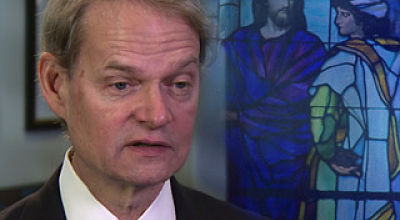Post-Christian Era? The Future of Faith in America
Decades ago, Time Magazinedeclared on its cover “God is Dead.” But today, a new book presents proof that for overwhelming numbers of Americans, God is very much alive.
Frank Newport, head of the respected pollster Gallup, has written a book called God is Alive and Well: the Future of Religion in America.
“We have well over 90 percent of Americans who in our survey questions say they believe in God,” Newport told CBN News. “So right there is evidence that, at least in the minds of the majority of Americans, God is quite alive.”
A Post-Christian Age?
The pollster’s book delves into what Gallup has discovered doing more than 320,000 interviews in 2012 and with similar numbers in earlier years.
Some have declared this era a post-Christian age, but Newport said not according to Gallup’s data.
“Seventy-five percent up to 80 percent of Americans are Christians,” he stated. “Americans are religious and may actually be becoming more religious in the years ahead.”
But Edwina Rogers, who leads the Secular Coalition for America, told CBN News, “I think the evidence shows just the opposite.”
For instance, this leader of one the nation’s most active atheist and agnostic organizations pointed out there’s a big difference between “churchgoers” and “believers.”
“Of people who participate in religion and go every week, among the Protestants, you have about 30 percent who actually go and don’t believe in God,” she said.
Rogers cited her own experience as a non-believer going to church events in her home state of Alabama.
“I went a few times as an early teen with girlfriends,” she said. “I liked the social side of it and got Coke and Lay’s potato chips, things like that.”
Rise of the Nones
Rogers pointed to research showing the number of non-theists and religiously unaffiliated has soared to 19 percent of Americans. And it’s double that among the young, Americans under age 30.
“There are quite a number of 10, 12, 14, 15-year-olds who will just come out and say that they’re atheists,” she said.
Gallup’s Newport acknowledged this growth.
“We call that the ‘Rise of the Nones.’ Now not n-u-n-s, like the Flying Nun, but n-o-n-e-s,” Newport said. “In other words, people who say when we ask ‘What is your religious identity,’ they say they don’t have any.”
Newport agreed faith can take a beating in one’s youth.
“Age 23 is the least religious age from 18 to death,” he explained. “If you do a graph, that’s the low point.”
But he said faith and church attendance pick up as Americans marry, have children, and age. He also cited research that shows that path can lead to better health and well-being.
“Being more religious actually causes one to have higher well-being,” he stated.
A Bright Future for Faith?
Newport believes as word of this gets around, it may make religion even more popular. And he has other reasons for seeing a bright future for faith.
For instance, those over 60 years of age are simply more religious, and baby boomers are beginning a senior explosion.
There’s also a migration to states that are warmer and better off economically. Many are in the Bible Belt, and newcomers tend to pick up the regional culture, even its religiosity.
But Rogers looked at other nations and said he thinks America may follow them and lose its faith.
“We have countries in Europe like Estonia where you only have 16 percent of the people in that country who believe in God,” she said.
Newport just doesn’t buy that argument.
“I wouldn’t say based on a look at all of our indicators that we’re moving into a post-religious or post-Christian era,” he stated.
Faith & Politics
When it comes to American politics, Newport and Rogers agree on a general truth: more religious equals Republican, non-religious equals Democrat.
Rogers pointed out that these “nones,” ironically enough, “are considered the largest religion within the Democratic Party.”
She brought up one telling event last year.
“The delegates down at the Democratic convention, they wanted no mention of God even put in their platform at all,” she said.
But Newport said he thinks Democrats may fight harder for religious voters in the future. He pointed to words from President Barack Obama at a recent prayer breakfast in Washington.
“In his view, religion translates basically into Democratic positions on issues, like equality and compassion for the poor, and things like that,” Newport recalled. “And that suggested to me the possibility that Democrats may begin to contest for the religious voter in the years ahead.”
Rogers, a long-time GOP activist, said it’s still about winning for the political parties. She’s seen the Republicans courting the non-theists as younger people swell the unbelievers’ ranks.
“They’re looking at the demographics. They’re looking at the trend,” she stated. “They’re seeing the growing numbers, especially under 30. And they would like to stay in business and win elections.”
The trend all points to cross-currents in politics and life in America, where more than 90 percent of the people believe in God, but where one of the fastest growing groups is those who have no religion at all.














































